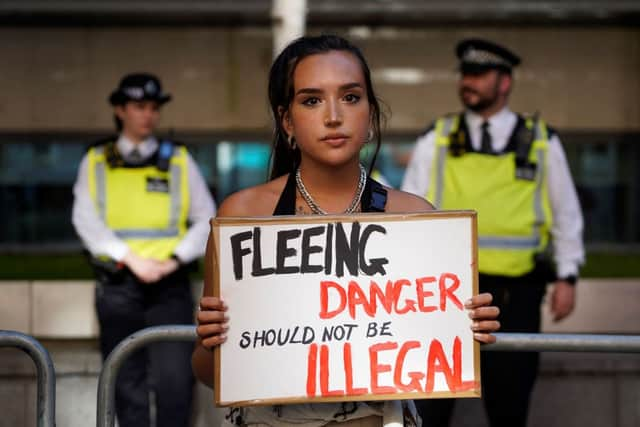UK Rwanda asylum deportation: policy explained - why are we sending refugees and migrants on flight to Africa?
and live on Freeview channel 276
Boris Johnson has accused immigration lawyers of “abetting the work of criminal gangs” as he defended his proposal to send asylum applicants to Rwanda, with the first flight planned on Tuesday (14 June).
The plans have been challenged in court and opposed by prominent bishops of the Church of England, as well as the Prince of Wales, according to reports, with the Prime Minister admitting that there has been criticism from “some slightly unexpected quarters.”
Advertisement
Hide AdAdvertisement
Hide AdJohnson said there was a “huge amount of attack” on the policy as he opened a Cabinet meeting in No 10.
But he stressed that the attacks, “not least from lawyers,” would not deter the government, telling his Cabinet ministers that "we are going to get on and deliver" the plan.
Here is everything you need to know about it.
What are the plans?
The Government intends to fly some migrants who have unlawfully entered the UK to the east African country to seek refuge.
Migrants will be medically assessed as they are brought ashore in Dover by Navy and Border Force officers before being transported to the Manston abandoned airfield and processing centre.
Advertisement
Hide AdAdvertisement
Hide AdThose found to have entered through dangerous or illegal methods will be held and subjected to a screening process before being sent to Rwanda.
The screening process is not only designed to exempt those with relevant vulnerabilities or safeguarding risks, but Rwanda also has to approve any application, and has stated that anyone with a criminal past will be rejected.


Chosen migrants will be flown to Rwanda on a chartered flight, where they will be housed in temporary housing, and their asylum claims will be examined.
According to a memorandum of understanding, the agreement between the UK government and Rwanda will last for five years.
Advertisement
Hide AdAdvertisement
Hide AdBut, the option of renewing the programme a year before it is due to expire has been kept open.
Why are we sending refugees to Rwanda?
The asylum plan’s stated aims are to reduce migrant crossings across the English Channel, end human smuggling and increase Rwandan investment and development.
Boris Johnson has stated that the strategy will "save countless lives" and will put an end to the economic models of "vile people smugglers”.
Johnson has said that tackling migrants crossing the English Channel in small boats, organised by gangs who are “getting away with in some cases, I think manslaughter, if not murder” has been "extremely difficult."
Advertisement
Hide AdAdvertisement
Hide AdThe Prime Minister claimed the Government was working with “humanity and compassion“ to tackle illegal immigration, and that it represented the tradition of “welcoming people” to the UK.
But refugee charities say the proposals do nothing to relieve the pressures that force migrants to pay criminals to load them into unsafe boats in order to cross a dangerous shipping lane.


The proposals have also been contested in court, and are opposed by major bishops of the Church of England, as well as the Prince of Wales, according to sources.
The archbishops of Canterbury and York, as well as other Anglican bishops in the House of Lords, have denounced the "immoral" scheme.
Advertisement
Hide AdAdvertisement
Hide AdArchbishop of Canterbury Justin Welby said: “Deporting asylum seekers should shame us as a nation.”
A letter to The Times, signed by the Most Rev Justin Welby and the Most Rev Stephen Cottrell, said vulnerable people should be offered safe routes to the UK and not deported.
How many people are being sent?
In an interview with the Daily Mail on 14 May 2022, Johnson revealed that fifty migrants had been notified that they will be moved to Rwanda in the next two weeks.
Due to legal challenges to the plan’s implementation, that initial time frame was delayed, and the first flight under the plan is now set for 14 June.
Advertisement
Hide AdAdvertisement
Hide AdMinisters had intended for up to 130 people to board the first aircraft, but Care4Calais, an NGO that filed a legal challenge against the plans, reported that only seven migrants still had tickets, after dozens won legal proceedings to be removed from the flight.
Only "some" migrants are expected to board the first one-way trip to Rwanda, according to Foreign Secretary Liz Truss, who said the first flight transporting asylum seekers to Rwanda will take off regardless of the number of people on board.
“I’m sure there will be some people on the flight, I’m not sure how many at this stage,” she told BBC Breakfast when asked if the flight would take off empty.
She stressed, however, that before the end of the year, "significant" numbers of people will be on one-way flights as asylum seekers.
Advertisement
Hide AdAdvertisement
Hide AdShe wouldn’t say what the figures will be by the end of 2022, but she did say on BBC Radio 4’s Today that they "will be significant".
But more legal objections are expected to be considered in court, even before the first flight departs.
Four people due to be on the planned deportation flight have brought a legal challenge to the High Court - each claimant’s lawyer will have 40 minutes to argue their case, on top of their written arguments sent to the court.
Truss did not deny that the charter flights might cost hundreds of thousands of pounds each, instead adding that she "can’t put a figure" on the cost, but that "it is value for money."
Comment Guidelines
National World encourages reader discussion on our stories. User feedback, insights and back-and-forth exchanges add a rich layer of context to reporting. Please review our Community Guidelines before commenting.
